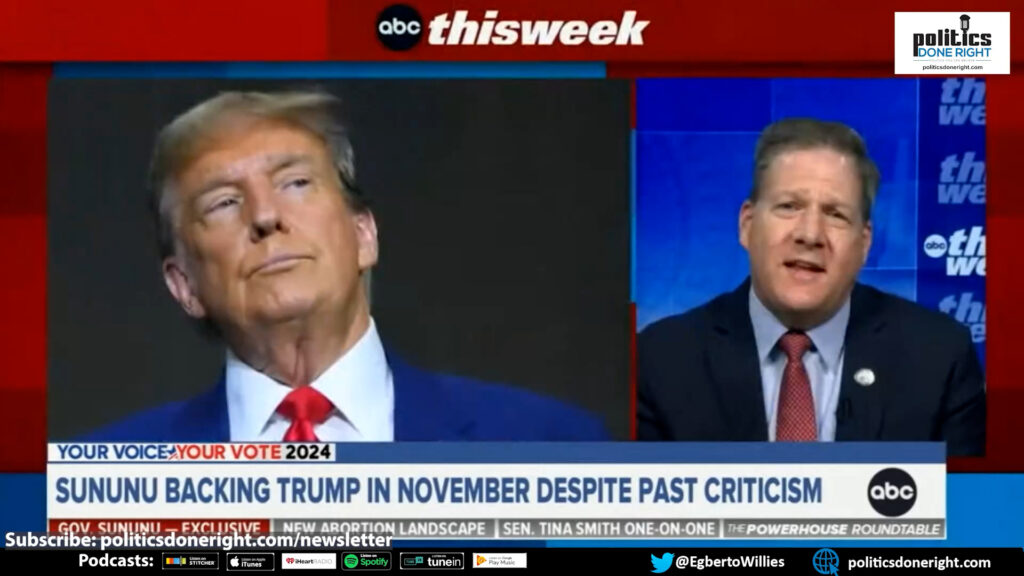NH Gov. Chris Sununu made a fool of himself as George Stephanopoulos questioned him about flip-flopping and supporting Donald Trump after calling out Trump for the insurrection and much more.
Stephanopoulos destroys an agitated flip-flopping Sununu.
Podcasts (Video — Audio)
In a recent interview, George Stephanopoulos confronted Governor Chris Sununu of New Hampshire, effectively dismantling the contradictory stances of a politician trapped in his own flip-flopping narrative. Sununu, once a vocal critic of Donald Trump, labeling him a “creep” and unfit for the presidency, has recently morphed into a staunch supporter, even amidst ongoing criminal trials and controversies surrounding the former president. This dramatic shift in allegiance provides a stark tableau of the political expediency and moral contradictions pervasive in today’s Republican leadership.
During the exchange, Stephanopoulos pressed Sununu on his renewed support for Trump despite his previous assertions that Trump’s actions and rhetoric had significantly contributed to the January 6th insurrection. The governor’s responses meandered through evasive rhetoric, highlighting a common tactic among politicians who seek to align with power currents, irrespective of their previously stated moral judgments. With pointed questions, Stephanopoulos laid bare the inconsistencies in Sununu’s stance, exposing the discomfort in supporting a leader potentially convicted of federal crimes.
Sununu’s defense hinged on a dissonant logic: he argued for a return to a Republican administration for its policy directions and not for Trump’s leadership qualities. This pivot from ethical considerations to political strategy underscores a broader trend within the Republican Party—prioritizing party loyalty and electoral strategy over principled leadership. Sununu exemplifies a diversion strategy by focusing on “culture change” and attacking so-called ‘wokeness, redirecting the conversation from Trump’s damaging actions to broader, more abstract grievances about cultural dynamics and economic issues.
The governor’s rationale for supporting Trump, irrespective of his legal convictions, speaks volumes about the current political discourse in America. It reflects a disturbing readiness to sideline the rule of law and ethical standards for political gain. Stephanopoulos’s interrogation highlighted the specific contradictions in Sununu’s rhetoric and posed a larger question about the moral compass of those in power.
Furthermore, Sununu’s argument that supporting Trump is about changing the culture in Washington illustrates a cynical manipulation of voter sentiment. By claiming that the administration would prioritize states’ rights, individual freedoms, and economic growth, he attempts to package a return to Trump’s leadership as a beneficial shift for the American people despite the former president’s role in inciting an insurrection and creating the platform for inflation with his tariffs on China. This is a classic example of using populist themes to mask deeper political and ethical problems within a party’s leadership.
The interview also discussed the implications of Trump’s potential convictions in various criminal cases. Sununu’s acknowledgment that Trump contributed to the insurrection but still deserves the presidency is a contradiction that Stephanopoulos did not allow to go unchecked. This highlights a key issue in contemporary political interviews: journalists need to hold public officials accountable by cutting through the noise of political rhetoric to reveal underlying truths.
This interview is a microcosm of the broader political landscape in the United States, where allegiance to a party often trumps ethical considerations. It serves as a critical reminder of the importance of journalistic rigor and the need for voters to evaluate their leaders’ statements and positions critically. As Stephanopoulos showcased, effective journalism involves asking the right questions and persisting in the quest for clarity and consistency in a landscape often muddled by political doublespeak.
The Stephanopoulos-Sununu interview is not just a demonstration of journalistic insight but a call to action for the media and the public. It challenges the electorate to demand higher standards from their elected officials and highlights the role of the press in dissecting political rhetoric to uncover the truth. As the political arena evolves, the need for vigilant, incisive media coverage becomes more critical. Voters must navigate this complex landscape with a clear understanding of the forces at play, guided by media that champions truth and accountability.
Viewers are encouraged to subscribe and join the conversation for more insightful commentary and to support progressive messages. Together, we can populate the internet with progressive messages that represent the true aspirations of most Americans.

